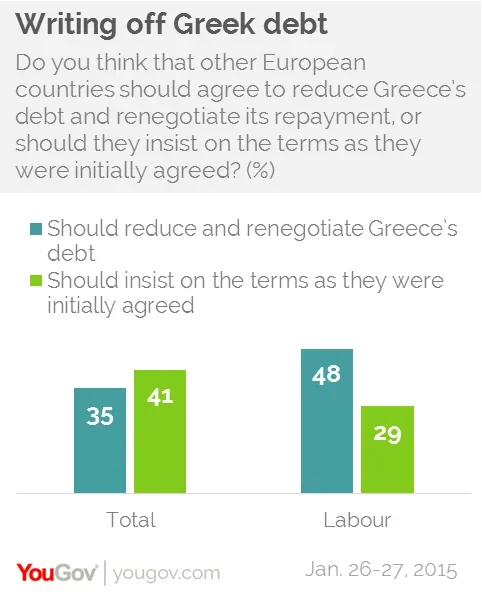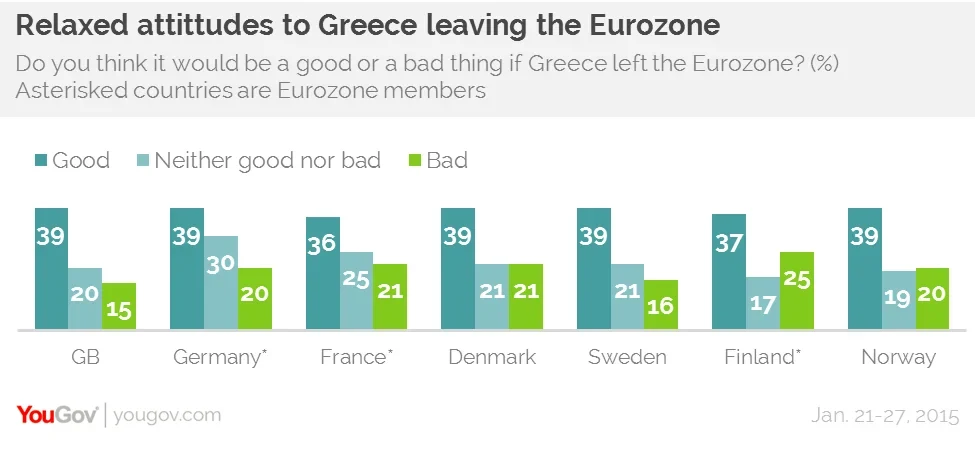Labour voters are sympathetic to writing off some of Greece’s debt to Europe – but on the whole Northern Europeans tend to favour a Greek Exit
Initially, the election of Greece’s radical left wing party Syriza sent shockwaves through the Eurozone’s markets, leaving the euro at its lowest level against the dollar for more than 11 years. Then the markets recovered, leading analysts to speculate that investors thought Europe would be stronger without Greece, or that Germany – the Eurozone’s most persistent advocate of austerity – would give in and renegotiate some of its debt.
New YouGov research finds the market’s view may be echoed in British and European public opinion. Overall, the British public are fairly evenly divided over allowing Greece’s debt to be partially written off. Additionally, polling of seven northern European countries finds a tendency to view a Greek exit from Europe as a good thing, or at the least not a disastrous thing.

Most sympathetic to a write off of Greece’s debt are British Labour voters. Much has been made of Syriza’s anti-austerity message and bottom-up style of community politics, and Labour voters tend to agree: 48% say Greece’s debt should be reduced and renegotiated by other European countries, compared to 29% who say the initial terms should be honoured. Overall, 35% say the debt should be partially written off; 41% say it should not be.
Labour voters are also more favourable to Greece staying in the Eurozone if it ceases to pay off its debts (36% say this, compared to 24% of the general public).
The partial backing of Syriza’s anti-austerity mandate likely comes from the general sense that public spending cuts have hindered Greece’s economy. Despite 43% seeing Greece’s treatment by Europe as fair and only 21% seeing it as unfair, 49% view the austerity measures imposed in exchange for bailouts as having been unsuccessful (13% say they have been successful). Indeed, British people tend to view austerity measures across the whole of the Eurozone as having hindered its economies, by 40-19%.
Grexit
Greece’s new Prime Minister Alexis Tsipras has tried to allay fears of a Greek exit from the Eurozone, insisting that he wants negotiation, rather than confrontation, with European leaders. That hasn’t stopped Germany’s finance minister Wolfgang Schäuble saying he is ‘relaxed’ about a Greek shock to the Eurozone, however – a feeling echoed across northern Europe.
Germany specifically has the highest proportion of people who say a Greek exit from the euro would be a good thing (39%) or neither a good nor a bad thing (30%). Britain and France are similarly at ease with Greece losing the currency, as are the Nordics.

In his first cabinet meeting since Sunday’s victory at the polls, Alexis Tsipiras today said Greece would not default on its bailout debts, however it would “not continue a policy of subjection". The cabinet is formed of radical economists (some Marxist), academics and human rights activists. Greece’s economy has shrunk 25% since the start of the Eurozone crisis, its debt is 175% of GDP and unemployment is at 25%; youth unemployment is nearer 50%.
PA images









